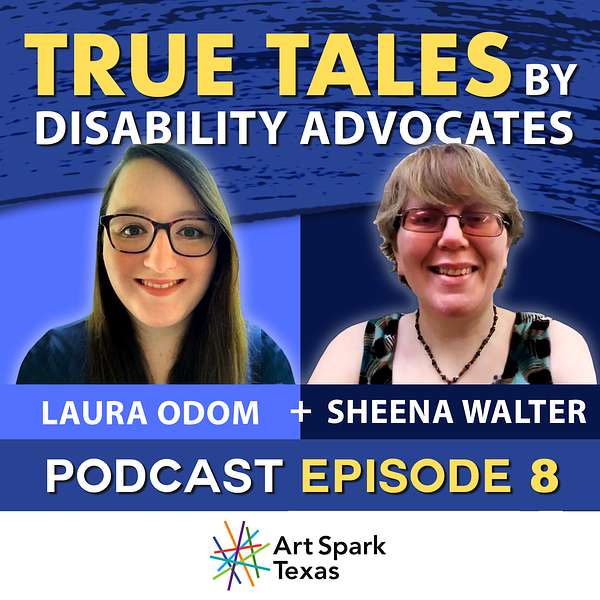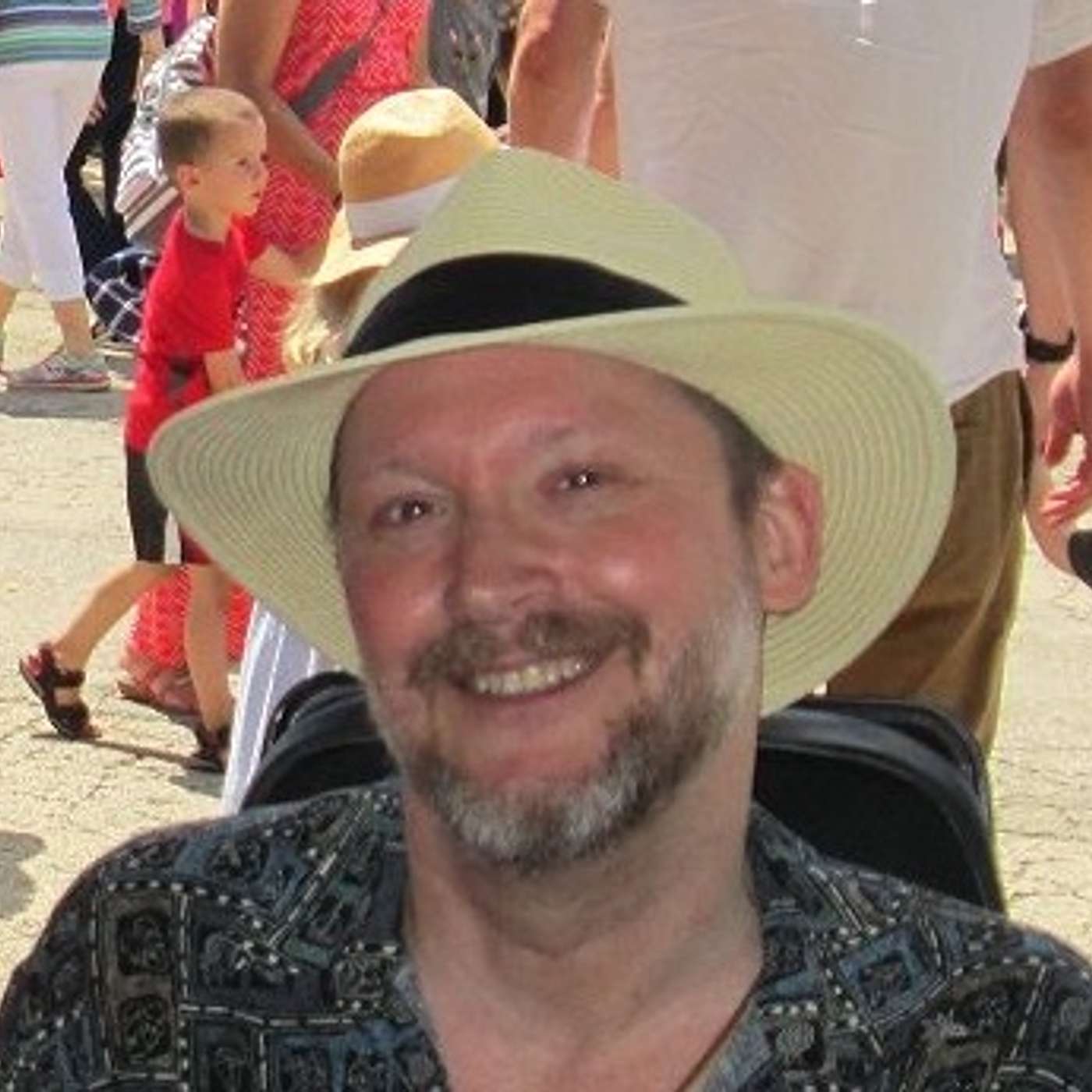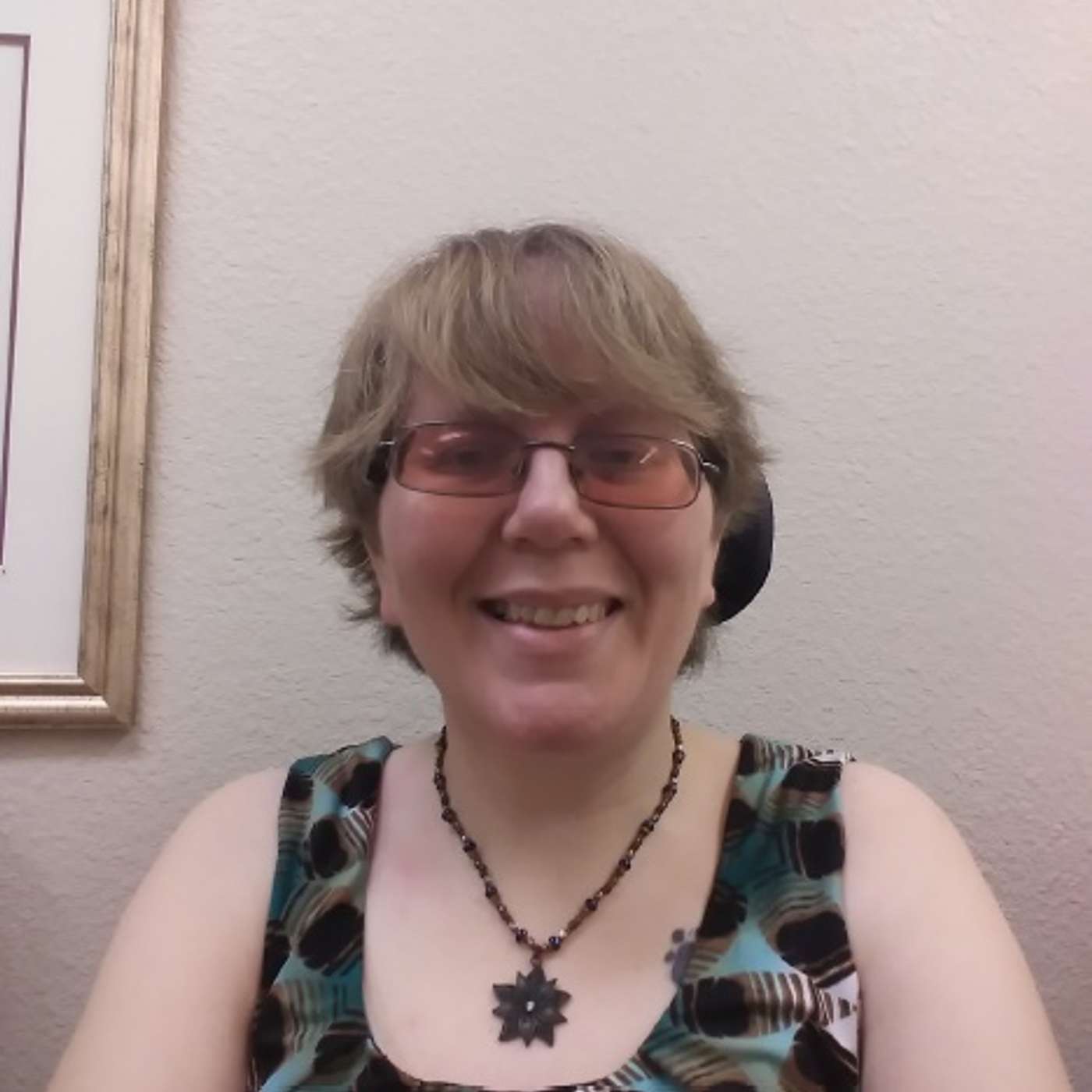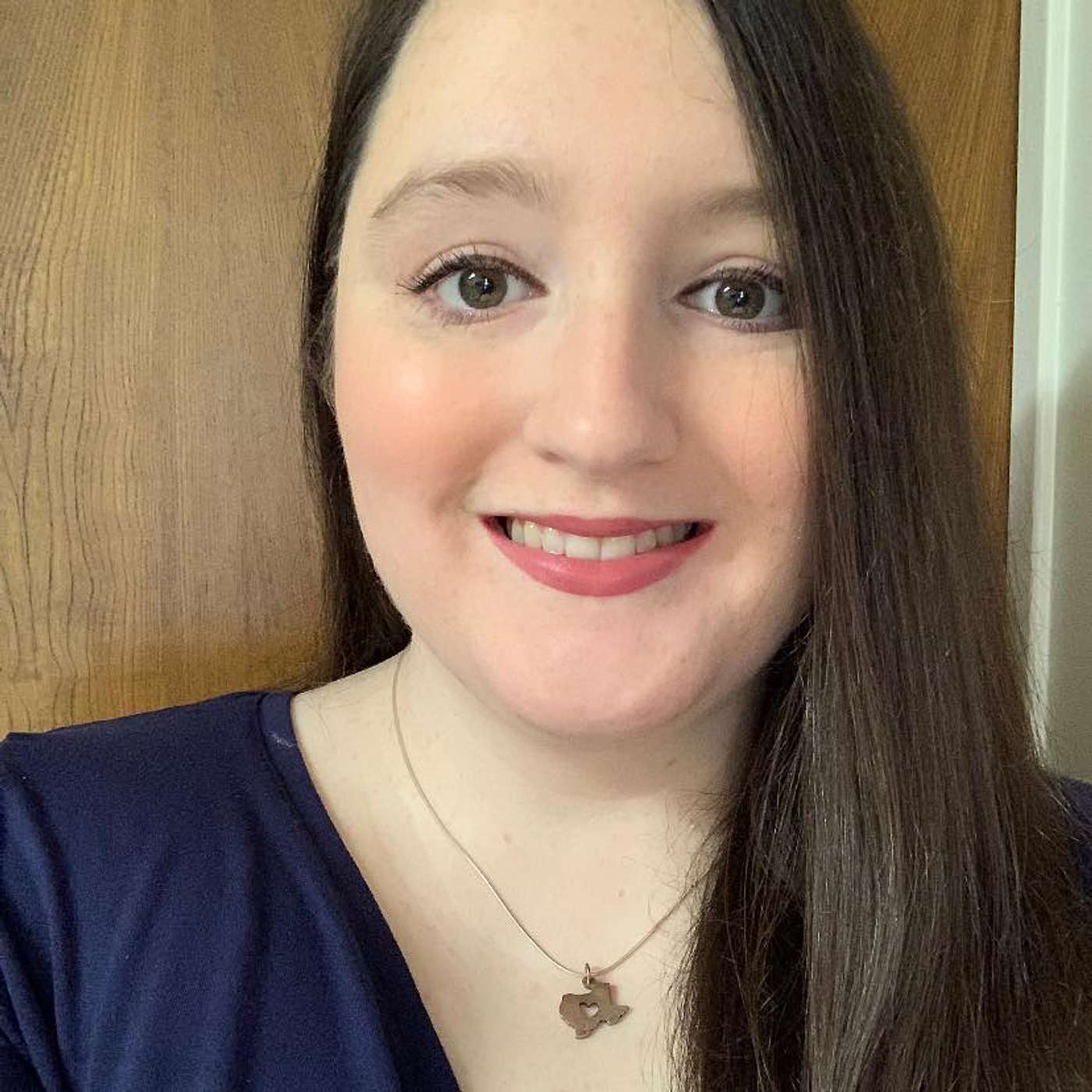
True Tales by Disability Advocates
Where advocates harness the power of storytelling to build community with their peers and hope to develop empathy in others. A team of disability advocates creates this True Tales podcast to share personal stories by disabled storytellers and add their voices to the growing community of podcast listeners.
True Tales by Disability Advocates
Awakenings
Full transcripts of all episodes available at https://truetalesbydisabilityadvocates.buzzsprout.com
In this episode, guests Laura Odom and Sheena Walter tell host John Beer about the “Awakenings” in their lives. Laura pushed through doubts brought on by years of narcolepsy to try her hand at a new adventure (“Finally Waking Up”), while Sheena flipped self-consciousness about her PICC line into a new and very public role of “Advocacy, Courage and Self-Compassion.” Both women took a stroke of boldness that ignited newfound lives of advocacy and pride in themselves! Listen in to learn about their victories. Toby Al-Trabulsi produces, Kristen Gooch and Ms. Boye mixing and editing, and Jennifer Howell and Joey Gidseg provide script and production.
HOST
No moss gathers on a rolling wheelchair, and throughout the state of Texas are sightings of John Beer and his travel trailer. With his wife's help, John spotlights the disability side of skydiving, fire evacuations and other topics for New Mobility magazine. You’ll also find him on MS Connections at TheMighty.com – and he's wheelie excited being on the team creating Art Spark Texas' new podcast, True Tales by Disability Advocates. John was a member of our first Virtual Speaking Advocates Training and is one of the storytellers in Episode 2, “Life on Wheels”.
Keep up with John Beer on his blog: Wheelieoutthere.blogspot.com
Follow John on Instagram: https://www.instagram.com/wheelieoutthere/
GUEST
Laura Odom is a Tyler, Texas-based advocate primarily for disability and rural causes. She is also the office manager for a locally owned textbook publisher. When she isn’t working, she takes her Australian Shepherd/Border Collie-mix dog for car rides and loves to snuggle with her two black cats. She enjoys writing, playing guitar and cross-stitching. Laura was diagnosed with Narcolepsy Type 1 in January 2021 after pursuing a diagnosis for almost 20 years. She continues to raise awareness about Narcolepsy in hopes that more people won’t have to wait that long to receive treatment.
On social media, you can find her at: Instagram: @ordinarileigh
TikTok: ordinarileigh
Twitter: @lauradoestweet
Facebook: Laura Ashleigh Odom
GUEST
Sheena Walter is an artist at Imagine Art in Austin and also works for Art Spark Texas as a social media influencer. She wants to advocate for a change in how people with disabilities are viewed in our society and make sure we have not just a seat at the table, but a voice as well. Her sources of strength and inspiration are her faith, her friends, her family, her pets and walks in the outdoors.
Find Sheena and her art on Instagram @sheenawalter1
For more details about our programs go to Art Spark Texas, True Tales Podcast Page.
Welcome to The True Tales by Disability Advocates, authentic voices of people. thriving with disabilities. Where individuals use the art of storytelling to change the world. The True Tales by Disability Advocates Podcast is produced by Art Spark Texas, Speaking Advocates Program. Keep listening to hear how life's challenges can spark a desire to speak out and advocate for yourselves and others.
MsBoye:You are listening to"Awakenings," Episode Eight of True Tales by Disability Advocates". The podcast where Advocates harness the power of storytelling to build community with their peers and hope to develop empathy in others. A team of Disability Advocates creates"True Tales" to give voice to the personal stories and lived experiences of disabled storytellers. We offer our unique and often underrepresented perspective to the growing community of podcast listeners worldwide. Did you know that according to the CDC, one in four Americans live with some kind of disability, and that is about 61 million adults with 61 million experiences and points of view about what it means to live with a disability. Art Spark Texas believes that everyone's life is enriched by the inclusion of multiple voices. And we have been training Disability Advocates as storytellers for over 20 years. Our host for this episode is John Beer. John was a member of our first Virtual Speaking Advocates Training Class and is one of the storytellers, in Episode Two,"Life On Wheels." He is joined by two of his classmates, Sheena Walter and Laura Odom, together they celebrate moments of awakening that changed their lives. Now, for many people, being given a diagnosis can be heartbreaking and terrifying. For others it can be a, call to action and rebellion and they refuse to be defined by the limitations of what they see as offensive stereotypical labeling. But for some of us, like me, diagnosis is a relief. Giving us insight into who we've been, permission to be who we are and expanding the possibilities of who we can become. It gives us the gift of connection with others, tribal affiliation and a longed-for sense of belonging. For Laura, her diagnosis of Narcolepsy was liberating. After struggling for years, with anxiety, self doubt, and a collection of other seemingly unrelated symptoms, she finally found a doctor who listened, validated her concerns and then made the correct diagnosis. Her story shows us that receiving the right diagnosis and therefore the appropriate treatment, can open up a world of new opportunities. No matter your experience or feelings about diagnosis, the ableism of the world around us is blatant and glaringly obvious, but our internalized ableism is insidious devious, and often comes disguised in a cloak of rationality. It can take control of us when we least expect it. Sheena shares her story about the gifts that came from waking up, recognizing and publicly naming the ableism, beneath her thoughts and feelings of embarassment From waking up, recognizing and publicly naming the internalized ableism beneath her thoughts and feelings of embarrassment. By choosing to risk self-compassion, both women became courageous self-advocates and found a new pride in themselves. By stepping out of their comfort zones, they were gifted with the embrace of empathic supportive nonjudgmental communities, which acknowledged and celebrated who they are as they are. We are so glad you've taken time out of your day to learn about their victories and through their stories you will experience the power of"Awakenings."
John:Welcome to the podcast, changing the world one story at a time. I'm John Beer your host for this episode. We're talking about awakenings we have as people with disabilities. Our guests, Sheena Walter and Laura Odom will share their stories of how they learned to live their authentic lives. Sheena, Walter is here to share her story,"Advocacy, Courage, and self-compassion." Welcome Sheena. Before you begin, would you like to tell our listeners what led you to The Speaking Advocates Program?
Sheena:When I first moved to Austin, my friend Renee Lopez invited me to attend the Opening Minds, Opening Doors program that Art Spark put on. She said she had taken the class and had grown a lot as a writer and speaker, and that was a great way for her to meet people. And I was looking to make friends, and that is how I became part of the program.
John:Thanks Sheena! Now your story. Take it away.
Sheena:My name is Sheena Walter and I'm here to share my story,"Advocacy, Courage and Self-compassion." Don't say anything, just let it go. Not anymore. Growing up, I learned to be a don't rock, the boat type of person, trying to please everyone making as few waves as possible. Growing up, I was expected to pass as much as possible, to be as much like my peers as it could be despite my disabilities. Over the years I've come to understand. I don't have to hide how my brain is wired or how I walk. It's not shameful to use a wheelchair as needed. I've had to learn, to find my voice and claim my place as a disabled adult in the world. I'm capable and valuable as I am. And so are my friends who have disabilities. I learned that it is important to challenge injustice and speak up for my rights. Although I am still an introvert and hesitant to confront people. I've learned how to do that in a kind, but for manner. I write letters that show I'm willing to work with a business, but not willing to accept discrimination. I am resourceful, articulate and talented. I use these skills to become an advocate for myself and others. It is okay for me to be proud of who I am and my work in the world. I have been honored to embody the belief that disability is not something to be ashamed of. It is not something that needs to be hidden. However, the stability of this belief was threatened when I got my PEG tube in December, 2020. I have a diagnosis, caused by one of my underlying medical conditions called Gastro-paresis. My stomach doesn't work well. I found myself purposely picking baggy and loose clothing in order to hide the tube. It seems getting the tube has challenged me to face a new level of internalized ableism. I use a wheelchair part time, but this didn't hit me as hard as it did when I got my tube. I felt shame, because I thought people wouldn't accept me with it. It's been a struggle. I heard somewhere you are only as sick as your secrets. The internalized ableism has reared its ugly head. It feeds on secrecy and I'm having to fight it hard. Committed to being healthy, I made the decision to come out about both my PEG tube and my internalised ableism. I decided to be brave. I wrote about my experience and took a selfie and posted both on social media. In the photo I'm wearing a shirt where you can see the outline of my tube and my swollen belly from gastro-paresis. This really isn't something I should feel, I need to hide to be accepted. It's part of my life. I shouldn't be expected by myself or others to hide my disabilities in order for society to see me as an equal person. I'm still integrating the kind supportive responses to my post. I continue to work through the ableism I've taken into myself as a result of past experiences and socially constructed ideas of normalcy and worth. In order to truly be not just accepting my disability, but embracing it and to fight these beliefs and feelings. They aren't fact, and aren't reality. I'm not less of a person because I am disabled. I am committed to living up to my belief that disability isn't something that needs to be secluded and locked away. As a society we need to not merely tolerate disability, but accept and embrace it. People with disabilities, are loved by God. People with disabilities are capable of being friends or significant others. We are no less beautiful, no less desirable, no less acceptable to be in public. We are no less because of how visible or invisible our disabilities may be. Not less period. Advocacy is often about talking out and taking action in the world, but being an advocate starts within me. If I want society to change their mindset about me as a person with disability, I must first change mine about myself.
John:Welcome back. I'm here again with Sheena. Thanks for sharing your story with us. You wrote your speech at the beginning of the year. So how has your situation changed since then?
Sheena:I had to have my PEG tube removed in February. The site was not healing well. Um, I might need a new tube in the future, but for now, things are pretty stable with changes in diet and medication.
John:Good. And what about people's reactions surprised you when you came out, posting the picture that didn't hide your peg tube?
Sheena:I was surprised at how accepting and supportive they were and they did not treat it like it was a big deal. Um, they still treated me like I was the same person. I became more accepting of having a tube and about the changes that my body was undergoing. They're just a human, human experience. We all experience, experience changes in one way or another, and it's nothing to be ashamed of.
John:You said."I had to learn to find my voice and claim my place as a disabled adult in the world. I'm capable and valuable as I am." I want to thank you for that message,'coz my younger self, I was hard on my wife as my caregiver and hard on myself because I tried to hide everything. So I, I wish I could have heard your message many years ago, and now I'm hoping that everyone can hear what you're saying. Right? So what are you working on now and how can listeners follow you?
Sheena:I'm an artist at Imagine Art here in Austin. And I do have an Instagram account SheenaWalter1, just the number one and you're more than welcome to follow me. Send me a message. I'd love to connect with you and thank you for having me on.
John:Thanks again. Stay with us for our second story when Laura Odom shares her own tale of awakenings. Welcome back to True Tales by Disability Advocates, we took our episode title Awakenings from the story of our next guest. Welcome, Laura Odom.
Laura:Thank you for having me.
John:Laura, before you share with us would you please tell our listeners what led you to The Speaking Advocates Program?
Laura:I was invited to Speaking Advocates by Joey, my friend err, who invited me to work on my storytelling abilities.
John:Great, well, we're glad to have you. Thanks, Laura, let's hear your story
Laura:Hi, my name's Laura and this is my story,"Finally Waking Up". I've always been shy and reserved. There aren't too many moments where I've ever made a presence. I've always tried to blend in with the wallpaper. I'm rarely loud, rarely comfortable in any environment or in any crowd. I'm uncomfortable in my own skin. Slowly I've been trying to break myself of this shyness and take ownership of my life. In order to make any progress however, I realized that I had to let go of my deep seated belief that I can't make decisions for myself. I had an awakening if you will,(get it, because I have narcolepsy?) and I realized that I was an adult and I don't have to ask permission to try a new hobby or go to a new doctor. I could just, do it. I also realized that for so long, I had thought so poorly of life because I was exhausted all the time. And I tended to focus on the negative. I was tired of looking at life bleakly, so I began to actively seek reasons to live and enjoy what time I have on earth. I found a doctor who was willing to listen to me, and who began to treat me for narcolepsy. Finally, some relief from my sleepiness. Now I had enough energy to try new things. I started taking guitar lessons, something I've wanted to do my whole life and traveling to meet with friends and family pre COVID. My favorite new adventure was an acting class. This was extremely out of character for me. I'd met the instructor, Garrett at a Comic Con and he told me he was offering an acting class. The thought of attending was terrifying, which is exactly why I wanted to do it. The class was small, only about six or seven students and it wasn't theater it was in front of a camera. I'd never felt more comfortable and freer to be myself within that class. Everyone was warm and welcoming. No one intimidated me. And I felt like I could really be myself. It was also the most confident I had ever felt. I really believed I could do what these students were doing and face the criticism I would get without feeling humiliated. For someone who's uncomfortable in her own skin, and always has a wall between herself and others. This is a huge empowering moment. I felt vulnerable, but instead of letting it inhibit me, like I have in the past, I allowed myself to be at peace with the vulnerability. It was a liberating experience. Unfortunately, COVID hit before I had a chance to attend another class, but I have something to look forward to when it's safe to go back.
John:Laura, thanks for sharing that. What was it about your acting class that made you go from feeling terrified to liberated?
Laura:I was afraid because this was something very new to me and it was outside of my comfort zone. But when I realized that the people in my class weren't judging me, they weren't going to make fun of me, I felt much more comfortable. Being able to relax in a room full of strangers was also really new to me. And I found that liberating because I'm not usually comfortable around new people
John:Right! So now when you're hit with a new challenge and you hear that voice of self-doubt how do you manage it?
Laura:I remind myself why I'm in the situation to begin with, whether it's to try something new, which is always fun and exciting. If it's to develop skills that I already have, in which case I already know that I can do whatever it is that I'm trying, this is just to improve on something that I'm already capable of doing.
John:So right! Laura, thanks again for giving us your look at your experience. Your, your story is so good at sharing you moving out of your cocoon at the beginning and then spreading your wings at the end. But to get there, you had a challenge, so you had to walk, through a door and, uh, listening to it, we all had that reaction of Yes!" Because we could relate. Beautiful job, Laura. So what are you working on now and how can listeners follow you?
Laura:I just created a Tik-Tok, so I'm going to try to do some videos about narcolepsy, my journey with being diagnosed and how long it took to get diagnosed. Things of that nature. You can find me on Tik TOK at"Ordinarileirgh" that's O R D I N a R I L E I G H. This is also my Instagram username, and you can find me on Twitter at"Lauradoestweet" one word and Facebook at"LauraAshleyOdom". Although I'm not on Facebook a whole lot.
John:All right! Well, thanks a lot, Laura, it was good having you here, I appreciate you sharing your message. Thanks.
Laura:Thank you for having me.
John:Alright! This show was produced by Toby Al-Trabulsi. It's edited and mixed by Kristen Gooch and Ms. Boye. Our script and production team includes Joey Gidseg, Jennifer Howell, and Kristen Gooch. Special thanks again to Sheena Walter and Laura Odom for appearing. I'm, host John Beer and you've been listening to the True Tales by Disability Advocates podcast. Don't forget to follow us on Twitter and Instagram.
Kamand:All episodes of The True Tales by Disability Advocates for free on Apple Podcasts, Spotify, and anywhere you get your podcasts. The program is funded in part by a grant from the Texas state Independent Living Council, the Administration for Community Living and individuals like you. To learn about the Speaking Advocates Program sign up for our newsletter at Art Spark Texas dot org. That's A R T S P A R K T X.org. This free virtual training is open to people of all disabilities, no matter where you live.





.jpg)







